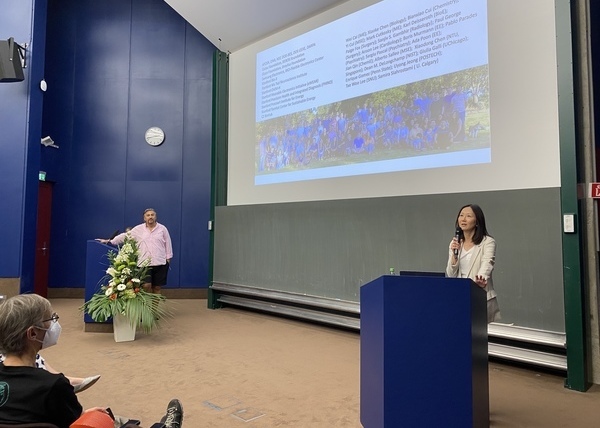Event continues with Intelligent Systems Summer Colloquium featuring a great line-up of speakers
Stuttgart – Prof. Zhenan Bao from Stanford University in California was the prominent speaker at this year’s Max Planck Lecture hosted by the Max Planck Institute for Intelligent Systems. In her talk entitled “Skin-Inspired Organic Electronics”, Zhenan Bao highlighted the right formula and the complex material properties needed to build electronic circuits made of plastic rather than silicon, and that mimic a human’s largest organ – technology that will revolutionize not only the electronics but also the medical industry.
Zhenan Bao is a chemist, chemical engineer, and material scientist. She teaches at Stanford University in the heart of Silicon Valley, where she and her team develop flexible and elastic materials, flexible electronics and energy devices which are inspired by human skin and can mimic the sense of touch. In 2016, the renowned scientific journal Nature named Zhenan Bao as one of the top ten people who matter most to the planet’s future.
Three decades prior to the Nature article, Zhenan Bao left China as a young woman, without speaking a word of English, to pursue a better life in the US and live the American dream. Coming from an immigrant family with little financial backing, she studied while holding down two jobs. Zhenan Bao, whose father was also a scientist, knew that if she did well, she would get into a good university. In 1995, she received her Ph.D. in Chemistry from the University of Chicago and then joined the technical staff at Bell Labs, Lucent Technologies, working there from 1995-2004.
The obsession to find new materials that would revolutionize electronic devices brought her to Stanford University in 2004. Zhenan Bao became a Professor at this University, teaching and researching in the heart of Silicon Valley where she and her team have set out to completely reinvent electronics. Zhenan Bao and her team of around 50 scientists from across the world develop stretchable plastics that are biodegradable, self-healing and as sensitive as human skin with its many natural haptic receptors. Zhenan Bao works on sensors that can help restore the sense of touch to people who are paralyzed, allowing them to again sense and feel their environment. What sounds like science fiction is perhaps only a few years away from reaching the market. Zhenan Bao has more than 700 refereed publications and over 100 US patents with a Google Scholar h-index of 190.
Zhenan Bao is also an outstanding entrepreneur. She is a co-founder and board member for PyrAmes, as well as for C3 Nano, a start-up based in San Francisco that makes flexible and transparent flat screens just a few millimeters wide. Tablets or smart phones could become as bendable as a kid’s toy. Solar cells could incorporate this biodegradable material; electronic companies and several car companies are lining up to buy the product. Zhenan Bao also serves as an advising partner for Fusion Venture Capital and is an advisor for multiple start-ups.
The Max Planck Lecture 2022 was followed by the Intelligent Systems Summer Colloquium, featuring a great line-up of guest speakers. Max Planck research group leader and team lead in the Tübingen AI Center Wieland Brendel spoke about “A more principled way towards machines that see the world like humans”, talking about how machines perceive the world and how the gap between humans and machines has narrowed.
Next up was Sayan Mukherjee, who spoke about “Modeling shapes and surfaces”. Mukherjee is an Alexander von Humboldt Professor at the University of Leipzig and a Max Planck fellow at the Max Planck Institute for Mathematics in the Sciences. The mathematician, statistician, and computer scientist is a leading expert in the field of artificial intelligence. In his talk, Mukherjee spoke about how modeling 3-dimensional shapes poses a challenge in data science.
The final talk was given by Betty Mohler, speaking about “Self-avatars and body perception”. Mohler is a Principal Research Scientist at the Tübingen-based Amazon Research Development Center, and focuses on human perception and developing immersive technology.
The Max Planck Lecture and the Intelligent Systems Summer Colloquium were followed by a party for the more than 150 guests, located in the outdoor area of the campus canteen.
zhenan bao
max planck lecture
metin sitti
michael Black
haptics
smart materials
skin




